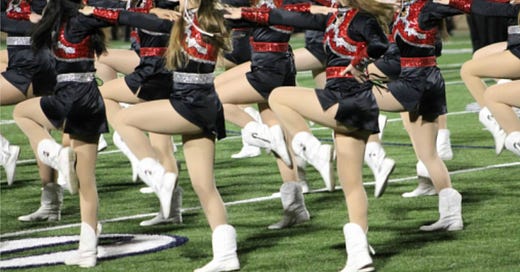At some point early on in my freshman year of high school in Houston, I got bounced by the popular crowd. I was never quite sure why, but for a while my friends had complained that I was always too serious, and needed to smile more, and use fewer big words in conversation. The popular boys disliked me with a ferocity that was alarming, and took turns pulling up to our house at night in their late model Trans Ams, headlights dimmed, and smashing our mailbox, light vandalism being one of their preferred weekend activities.
The movements of the girls who no longer wanted to be friends with me increasingly centered around two Christian groups that dominated social life at Memorial Senior High School, Young Life and Campaigners. Young Life was co-ed, and focused on community, and Campaigners was an all-girl Bible-study group. As a Jewish girl, I wasn't qualified for entry to either, unless I took the rather extreme measure that two girls at my school, the Jacobs sisters, did, when they broke with their family and converted.
The lengths the Jacobs sisters went to in order to feel like they belonged at Memorial High was extreme, but I got it: being a Jew in Houston, Texas in the late 1970s was a tricky proposition. There weren’t a whole lot of us. And all of my friends had personal relationships with Christ; I missed out on a lot of important social developments in my crowd because I didn't.
A few friends were vocal about the fact that they worried for my soul. One of them, Jo Lynn, ripped a full-page Bible hotline ad from the TV Guide and handed it to me before school one morning with a grave expression on her face. She was concerned, she told me, that I'd be excluded from heaven, and she wanted to help me get there. Jo Lynn also gave me her copy of a New Testament created for adolescents—it was called The Way, and had pictures of smiling, wholesome teens on the cover—and suggested I take a look. I felt like a criminal bringing it into my home, and hid it under the bed, like contraband.
I didn't ever study it, as I promised Jo Lynn I would, and was never at any risk of converting to some more socially acceptable religion. All it took for me to remind myself that I was intractably Jewish was a visit across town to my grandparents' house. They were named Gelta and Louis, and were a couple of New Yorkers who'd moved to Texas in the 1940s because my grandfather was possessed of the frontier spirit, and wanted to relocate the family business, a glass concern, there. Gelta hated Texas—she missed her sisters back in Manhattan—but Louis loved everything about it. He promptly bought my mother and her sister horses and himself a Stetson hat, and wore cowboy boots with his suit to work.
Keep reading with a 7-day free trial
Subscribe to Girls of a Certain Age to keep reading this post and get 7 days of free access to the full post archives.




